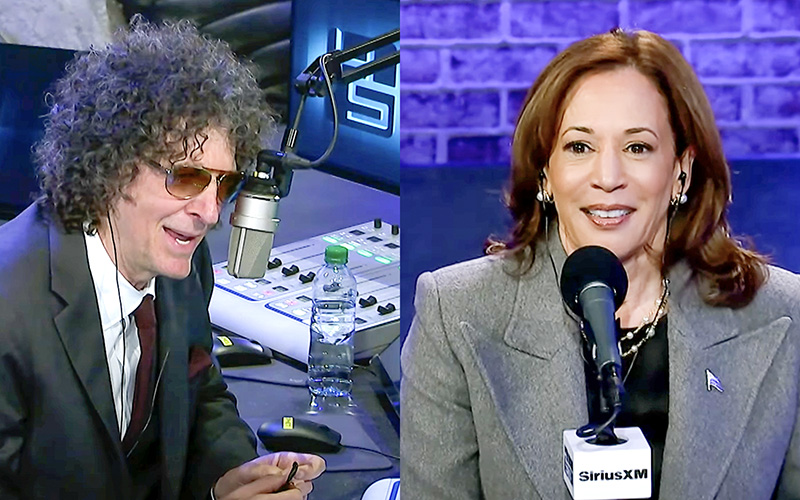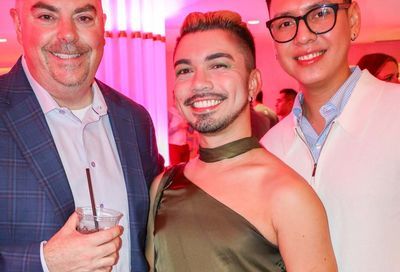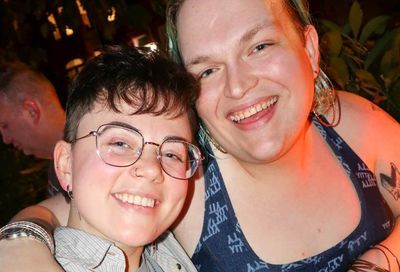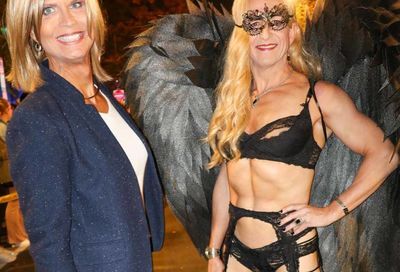A 6-3 Supreme Court could carve out various exemptions that erode LGBTQ rights
Even with Justice Amy Coney Barrett, the Supreme Court is likely to "chip away" at LGBTQ legal protections over time, experts say
By John Riley on October 28, 2020 @JRileyMW

Following Amy Coney Barrett’s confirmation to the U.S. Supreme Court, LGBTQ advocates are looking down the road at the possibility that a 6-3 conservative majority would roll back or erode some LGBTQ protections by carving out various religious exemptions.
During Barrett’s confirmation hearings, Democrats raised concerns about her views on LGBTQ rights, with Sen. Mazie Hirono (D-Hawaii) casting Barrett as a “danger” to civil liberties and civil rights on multiple fronts. As evidence, Hirono pointed to the appeals court judge’s past criticism of the Supreme Court’s marriage equality decision in Obergefell v. Hodges, as well as her use of the term “sexual preference” in lieu of sexual orientation.
Other LGBTQ advocates, including the Human Rights Campaign, have also raised concerns about Barrett’s ability to be impartial, citing her past writings criticizing courts who ruled that transgender people are protected from discrimination under federal law.
On Nov. 4, the high court will hear oral arguments in Fulton v. Philadelphia, a case in which the Trump administration is backing Catholic Social Services in its demand that it be allowed to receive taxpayer funds even as it refuses to place children with prospective foster or adoptive parents, including same-sex couples, based on its religious beliefs. The city of Philadelphia argues that such a policy violates the city’s LGBTQ-inclusive nondiscrimination law.
“The Fulton case is a big case before the court this year addressing the question of religious exemptions,” Cathy Sakimura, the deputy director and family law director at the National Center for Lesbian Rights, told Metro Weekly in an interview. “But I think it also raises questions about the state’s obligation to address discrimination generally within the child welfare system, and in all of the systems that states support and provide to their citizens.”
According to the Center for American Progress, the foster care system currently houses an estimated 443,000 children. If the justices side with Catholic Social Services in the case, and grant a religious exemption for child placement agencies, there could be a backlog when it comes to placing children with qualified foster or adoptive parents, as the pool of available placements dwindles.
Data from a survey conducted by CAP and NORC at the University of Chicago found that LGBTQ people or same-sex couples who are turned away would likely have trouble finding alternative agencies with which they could work. Two in 5 LGBTQ adults said that it would be “difficult” or “impossible” to find an alternative adoption agency if they were turned away.
Even more troubling, perhaps, would be that the ramifications of the Fulton case would extend far beyond the child welfare system, potentially opening the door for other entities, including homeless shelters, hospitals, food banks, and disaster relief agencies to claim similar exemptions as justification for refusing to provide services to LGBTQ individuals.
See also: Supreme Court says religious schools can fire LGBTQ employees, despite state nondiscrimination laws
David Flugman, a partner at Selendy & Gay PLLC in New York City, who authored an amicus brief in the Fulton case asking the court to decide in favor of the city of Philadelphia, said in a statement that Barrett’s confirmation hearings last week provided “no comfort” to the LGBTQ community that their rights would be protected by a 6-3 conservative majority.
In an interview with Metro Weekly, Flugman noted that the larger issue at play in Fulton is whether a 30-year-old ruling finding that if a law is generally applicable and neutral towards religion, it is constitutional. He says the widest possible ruling in Fulton would be a decision that overturns that rule and requires the government to meet strict scrutiny, or provide a compelling reason for the law on the grounds that its intended outcome cannot be achieved by any other means. If the court requires such a standard, it actually tips the scale in favor of religious entities, at the expense of LGBTQ rights and other civil rights.
Sasha Buchert, a senior attorney with Lambda Legal, offered a similar assessment.
“If the Supreme Court decides to issue a broad ruling saying that all generally applicable nondiscrimination laws have this gaping exemption that allows people to get federal funding but but not play by the same rules with respect to nondiscrimination laws, that’s going to set back a lot of vulnerable communities, and create LGBTQ people into second-class citizens to some extent, because that’s who experiences the most discrimination from these federally funded entities.
“One thing that gets lost in this discussion is the impact on people that are going to be harmed by such a decision,” she added. “It certainly would be LGBTQ parents, but it also would be LGBTQ foster youth in out-of-home care. It opens the question about how they’re going to treat youth in their custody, if they’re going to try to impose conversion therapy on them, for example.”

In terms of other issues that might come before the court, such as the constitutionality of the court’s Obergefell decision in 2015 that legalized same-sex marriage, both Sakimura and Flugman are skeptical that the court would go so far as to completely overturn the decision, despite recent calls by Supreme Court Justices Clarence Thomas and Samuel Alito to revisit the issue and the conflicts that same-sex marriages pose to the religious freedom of those who oppose homosexuality.
“Our view is that marriage is firmly ensconced. It would be difficult to see actual complete overturning of Obergefell and Pavan“– a decision relying on Obergefell finding that married same-sex partners have a right to be listed on their children’s birth certificates — “although these are concerning comments to be hearing from sitting Supreme court justices about a constitutional right that has clearly been established,” Sakimura said of Thomas and Alito’s recent statements.
She added that she does not expect to see either case overturned, but even if the 2015 same-sex marriage decision were, it wouldn’t be as drastic as people might assume.
“Overturning Obergefell does not mean that no one will be married anymore. Usually ,when a case is overturned, it’s overturned in specific ways. And so there might be limitations or changes, and probably the most likely is to address how marriages are treated by private citizens. And obviously, there’s a great focus on anti-discrimination laws. I think that is much more broadly before the court this term, than marriage itself.”
Related: Pete Buttigieg is worried about his marriage if Amy Coney Barrett is confirmed to the Supreme Court
Flugman agrees, saying he does not believe an overturn of Obergefell is likely.
“The more likely path forward, if there is to be kind of a governing conservative majority on the court, is this kind of erosion at the rights and privileges that go along with marriage,” he said. “The Fulton case is a real clear example of that. Obviously, cases in the wedding context are another example of that, with Masterpiece Cakeshop and things like that.
“I think the biggest and most dangerous one is in the sphere of health care. Particularly given the fact that there are so many hospitals that are run by religious denominations,” Flugman added. “And the idea that that that a health care provider could refuse to provide service to an LGBT person or a transgender person or a child of LGBT parents because they have some type of religious objection to being transgender, to having an LGBT family, to hospital visitation rights.”
But such denials of care or refusals to treat LGBTQ patients would create several other problems.
“What do you do with someone who comes in seeking emergency services and we know and suffers adverse consequences? Is the Supreme Court going to shield hospitals from liability that flows from their failure to provide adequate care?” he asked. “Are state licensing board is going to be able to regulate that sort of conduct because medical professionals are are licensed by the state? Can New York or California say that they are going to prohibit these sorts of practices, and will the Supreme Court, if it comes up rule, as a matter of the First Amendment free exercise, that it’s perfectly within the rights of a hospital system run by the Catholic Church to deny treatment to a gay person?
“It’s potentially quite dangerous and quite impactful, specifically for the LGBT community, although it’s certainly not the only community that would be adversely affected in such a way.”

Buchert noted that any decision weakening or eroding marriage rights would have a much more broad impact.
“It doesn’t just apply to the actual marriage, it applies to the constellation of benefits that extends to married couples across the country,” she noted. “This isn’t a hypothetical fear. We’ve had cases that have risen to the State Supreme Court in Texas, challenging whether same sex couples could be able to receive equal benefits. There’s a judge that was confirmed to the 5th Circuit Court of Appeals named Judge Willett, who was on the Supreme Court in Texas when they ruled that Obergefell isn’t the end. They tried to narrowly apply the case so it didn’t apply to the rights and benefits that people experience as a matter of equality.
“So whether it’s birth certificates, as in the Pavan case, or retirement benefits for workers, Social Security benefits for surviving same-sex spouses, there are numerable benefits there that are at risk with a conservative Supreme Court,” Buchert said. “And we know that opponents of equality have continually tried to challenge these decisions.”
Buchert added that newly confirmed Justice Barrett is less likely to be a lightning-rod, and more a justice that tries to slowly reverse protections over time, with little fanfare.
“This is not somebody who’s going to get on court and demand that Obergefell or Roe v. Wade be overturned directly,” she said. “In the first case that comes before the court, she’s going to be chipping away at protections using the model of the fight over abortion, trying to weaken it, to create ‘skim-milk marriages,’ create a second-class status for LGBTQ people in numerous ways. People who are looking for her to overrule Obergefell v. Hodges or Roe v. Wade are looking at the wrong thing. They should be looking at the cases that come up before the court that will water down their rights.”
But Sakimura noted that Barrett’s confirmation and a 6-3 conservative majority is not the death-knell for LGBTQ rights that opponents expect it to be. Instead, LGBTQ advocates will simply have to find other paths, or advance other legal theories to protect their civil rights.
“We are already in a situation where the court is more conservative than it was 10 or 15 years ago,” she said.” And of course that shapes the law that comes out of the court and, you know, the approach to advocacy. But, you know, the court, the Supreme Court has swung right and left repeatedly for essentially its entire tenure. That is not new at all. And yet we find ways to continue in our quest for justice.”
Read more:
LGBTQ advocates: Amy Coney Barrett’s Supreme Court confirmation a “sham” and “power grab”
WATCH: Bob the Drag Queen, Eureka O’Hara, and Shangela host “#WeVote” drag roll call
Hundreds of thousands of trans and nonbinary people could face obstacles in voting
Kamala Harris to Howard Stern: ‘Trump is a Threat to Gay Rights’
The Democratic presidential nominee warned the radio host that a Trump presidency would likely serve a devastating blow to same-sex marriage.
By John Riley on October 15, 2024 @JRileyMW
Vice President Kamala Harris recently appeared on The Howard Stern Show to speak about her presidential campaign and pitch herself to the radio host's massive audience. She opened up about various topics, including the risk that a future Trump administration would pose to same-sex couples.
During last Tuesday's hour-long interview, Stern, a supporter of LGBTQ rights, mentioned how Senate Republicans had refused to consider any nominees for the U.S. Supreme Court after the death of Antonin Scalia, denying President Barack Obama the chance to nominate a liberal justice to the court. The high court is now skewed 6-3 in favor of Republican appointees -- including three named by Trump -- and, should Trump win again, could skew even further right.
Italy Criminalizes Surrogacy Abroad for Same-Sex Couples
Italy has made it all but impossible for gay men to start families, criminalizing surrogacy abroad after previously banning gay adoption.
By John Riley on October 24, 2024 @JRileyMW
Recently, Italy passed a law that criminalizes seeking surrogacy abroad, striking a blow to the avenues that gay men and infertile couples, both straight and LGBTQ, can pursue to become parents.
Surrogacy is already illegal in Italy. But Prime Minister Giorgia Meloni's right-wing government, Brothers of Italy, has sought to punish Italians who pursue surrogacy in countries where the practice is legal, such as the United States.
The law appears to be the broadest prohibition passed by any Western nation, although domestic surrogacy is barred in other countries, like Germany and France, and is restricted in other nations, like the United Kingdom and Greece.
Chase Strangio Will Make Transgender History at Supreme Court
The ACLU lawyer will argue that Tennessee's ban on gender-affirming care -- and those in other states -- should be overturned.
By John Riley on October 24, 2024 @JRileyMW
The U.S. Supreme Court has granted a petition for divided argument in U.S. v. Skrmetti, the federal challenge to Tennessee's law prohibiting doctors from prescribing treatments for gender dysphoria to transgender youth.
The court previously agreed in June to take up the case, as well as its companion case, L.W. v. Skrmetti, during the 2024-2025 court session.
The outcome of the case will likely determine the fate of similar laws in 23 other states, where Republican lawmakers have sought to criminalize the provision of gender-affirming care, like puberty blockers or hormones, to transgender youth to help them transition and assuage their feelings of gender dysphoria.
Support Metro Weekly’s Journalism
These are challenging times for news organizations. And yet it’s crucial we stay active and provide vital resources and information to both our local readers and the world. So won’t you please take a moment and consider supporting Metro Weekly with a membership? For as little as $5 a month, you can help ensure Metro Weekly magazine and MetroWeekly.com remain free, viable resources as we provide the best, most diverse, culturally-resonant LGBTQ coverage in both the D.C. region and around the world. Memberships come with exclusive perks and discounts, your own personal digital delivery of each week’s magazine (and an archive), access to our Member's Lounge when it launches this fall, and exclusive members-only items like Metro Weekly Membership Mugs and Tote Bags! Check out all our membership levels here and please join us today!
The Magazine
-
Most Popular
 Sarah McBride Criticized for Complying with Restroom Ban
Sarah McBride Criticized for Complying with Restroom Ban  Man Sentenced to Life for Murder of Gay Jewish Student
Man Sentenced to Life for Murder of Gay Jewish Student  Gay Adult Film Star Blasted for Hailing Trump's Victory
Gay Adult Film Star Blasted for Hailing Trump's Victory  Trump Taps Anti-LGBTQ Matt Gaetz for Attorney General
Trump Taps Anti-LGBTQ Matt Gaetz for Attorney General  Kierra Johnson: To Fight Trump, We Must “Lean Into Community”
Kierra Johnson: To Fight Trump, We Must “Lean Into Community”  A Grim Report Details Anti-Trans Violence in America
A Grim Report Details Anti-Trans Violence in America  Same-Sex Kiss Cut from 'Gladiator II'
Same-Sex Kiss Cut from 'Gladiator II'  John Leguizamo's America
John Leguizamo's America  Speaker Mike Johnson Imposes a Trans Restroom Ban
Speaker Mike Johnson Imposes a Trans Restroom Ban  The WNO's 'Macbeth' is a Soaring Operatic High
The WNO's 'Macbeth' is a Soaring Operatic High
 Sarah McBride Criticized for Complying with Restroom Ban
Sarah McBride Criticized for Complying with Restroom Ban  Man Sentenced to Life for Murder of Gay Jewish Student
Man Sentenced to Life for Murder of Gay Jewish Student  Speaker Mike Johnson Imposes a Trans Restroom Ban
Speaker Mike Johnson Imposes a Trans Restroom Ban  Gay People Targeted with 'Re-Education Camp' Texts
Gay People Targeted with 'Re-Education Camp' Texts  A Grim Report Details Anti-Trans Violence in America
A Grim Report Details Anti-Trans Violence in America  Nancy Mace Wants to Ban Sarah McBride from Capitol Restrooms
Nancy Mace Wants to Ban Sarah McBride from Capitol Restrooms  Staten Island St. Patrick's Day Parade to Allow LGBTQ Groups
Staten Island St. Patrick's Day Parade to Allow LGBTQ Groups  LaMelo Ball Fined $100,000 by NBA for Anti-Gay Slur
LaMelo Ball Fined $100,000 by NBA for Anti-Gay Slur  Rodrigo Heng-Lehtinen on “The New Chapter of Our Resistance”
Rodrigo Heng-Lehtinen on “The New Chapter of Our Resistance”  Same-Sex Kiss Cut from 'Gladiator II'
Same-Sex Kiss Cut from 'Gladiator II'
Scene
Metro Weekly
Washington's LGBTQ Magazine
P.O. Box 11559
Washington, DC 20008 (202) 638-6830
About Us pageFollow Us:
· Facebook
· Twitter
· Flipboard
· YouTube
· Instagram
· RSS News | RSS SceneArchives
Copyright ©2024 Jansi LLC.










You must be logged in to post a comment.